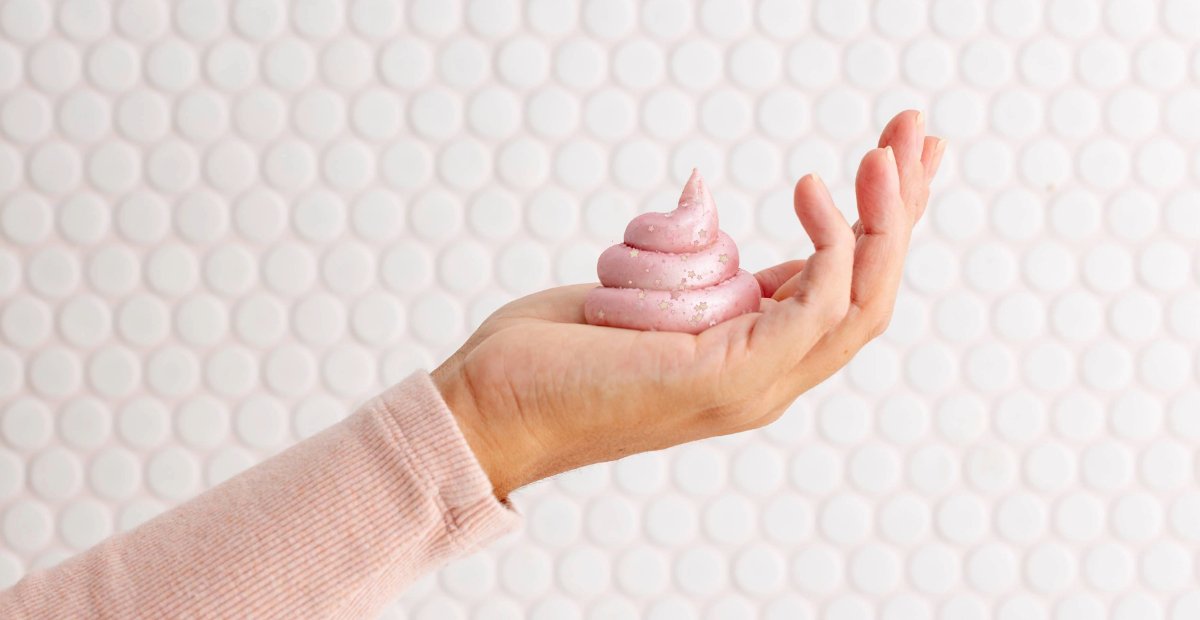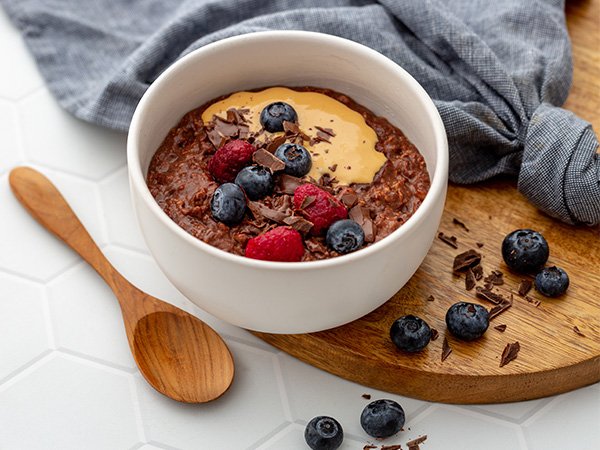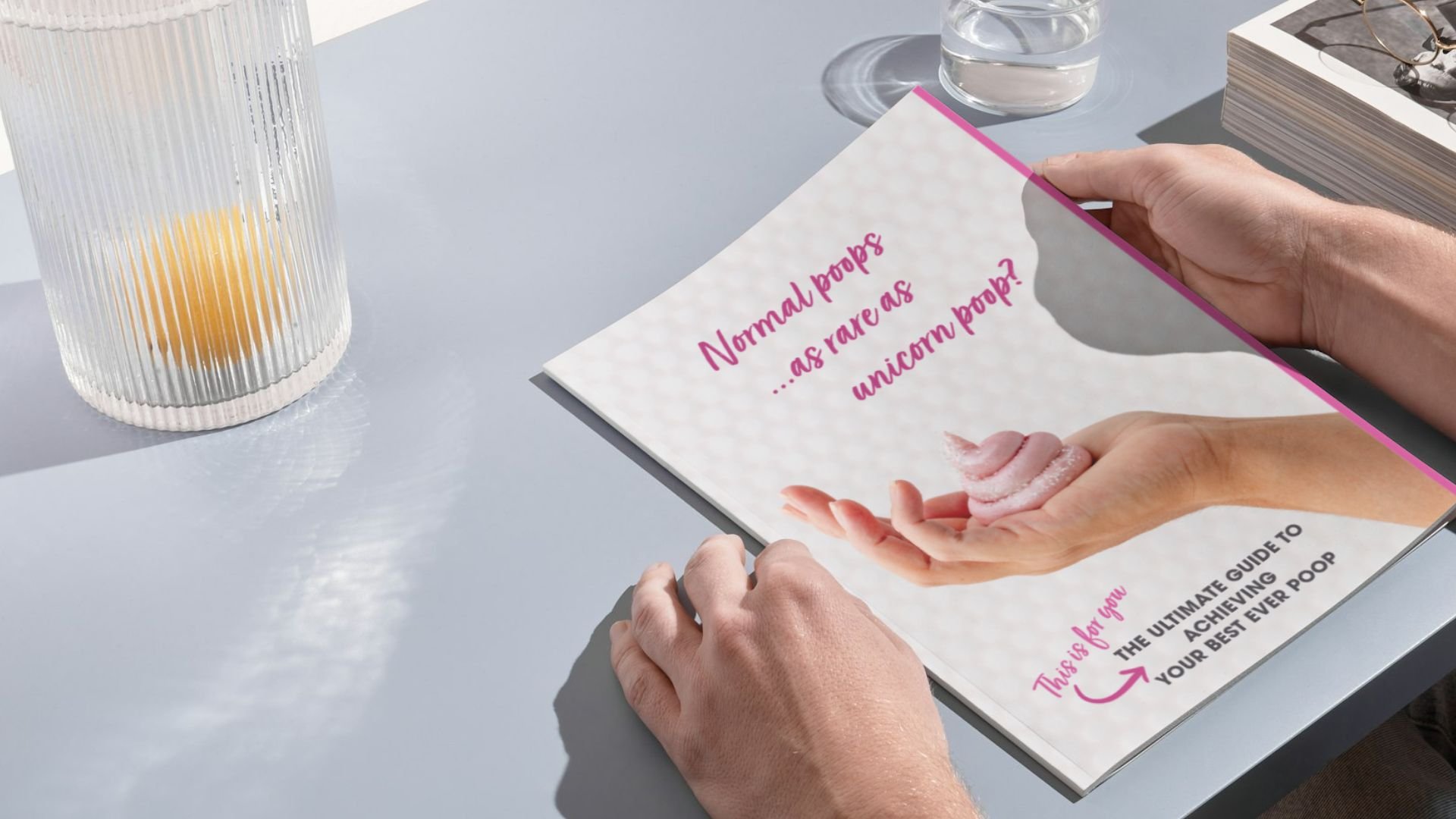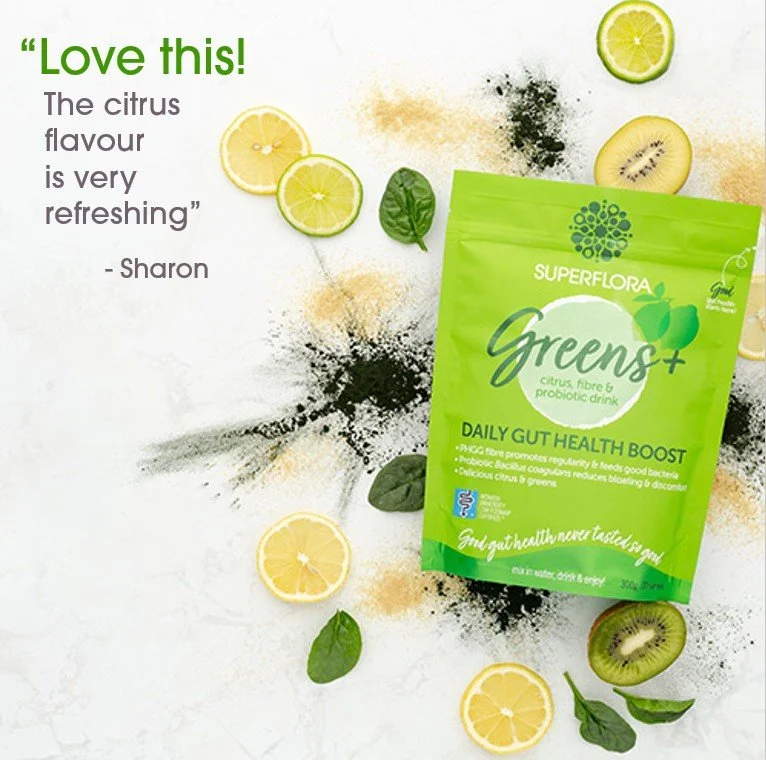
Normal poops… rarer than unicorn poop?
Follow our program to achieve your best ever poop
With information on fibre types AND delicious recipes
Get your FREE Best Every Poop eBook TODAY!
Dreaming of normal poops?
Reclaim your freedom and live life to the full
Want the secret to regularity?
We've been there too, and worked out there's no need to kiss a frog, or wait for your fairy godmother to wave her wand.
Turn to science, not snake oil. Add our seven favourite high-fibre foods to your diet and you'll be on track for your best ever poop.
Fibre keeps things moving and softens and bulks-up our poops. It also provides important food for our gut bacteria, contributing to gut and overall health.
Most Australians are not consuming enough fibre. The target is 25g a day for women and 28g a day for men. The tables in our e-book help you calculate your daily intake.
If you have constipation, optimal results come from a mix of both soluble and insoluble fibre. If diarrhoea is your problem, you’ll want to stick to soluble or gel-forming fibre. We’ve indicated slowly fermented options to suit everyone including those with IBS and prone to bloating.
Sounds too complicated? - don’t worry, we’ve done the hard work for you. Read on for our favourite gentle high-fibre foods, try our delicious recipes and prepare to put on your tiara and party.
Open the door to good gut health today!
We’ve done the hard work for you. Our plan has:
Information about our favourite sources of fibre and how to enjoy them
15 delicious recipes for you to try
Fibre Targets and Fibre Content Tables for common foods
Scroll down to request the e-book,
but first find out why it helps to include Superflora in the mix…
A new type of fibre
Yes, we know you’ll do your best to incorporate fibre-rich whole foods into your diet….but if you’d also like a quick and easy option (that’s as close as you’ll get to a magic potion), check out our Superflora Daily Gut Health Boost.
Include it as a daily morning ritual and you’ll reap the rewards of:
prebiotic PHGG fibre that promotes regularity and feeds good bacteria
probiotic Bacillus coagulans MTCC 5856 that reduces bloating and discomfort
delicious real fruit powders for great natural flavour
PHGG helps food move through the gut at just the right pace, meaning our Boosts will help your get your life back whether you struggle with constipation or diarrhoea..
Our Boosts are also certified low FODMAP by Monash University. Find out more here.
Don’t take our word for it…
Favourite Fibre
-

Kiwi fruit
Two green kiwi fruit per day are clinically proven to improve symptoms of constipation without causing bloating or abdominal pain.
Gold kiwi fruits also improve syptoms and taste a little sweeter.
2 medium green kiwi contain 4 g of fibre.
Kiwi fruit are also a great source of Vitamin C and other antioxidants.
Read more in our blog
-

Chia seeds
Chia seeds were a key component of the Aztec diet. Today they are grown across the globe including in Australia.
The fibre in chia seeds forms a gel that attracts water during digestion. This bulks up and softens the stool making it very easy to pass. The fibre in chia seeds is non-fermentable, which means it won't cause lots of gas or bloating that can be problematic for people who suffer from IBS.
Soak in liquid (or yoghurt) before eating and, as wth all fibre, drink plenty of water.
2 tbsp of white or black chia seeds provide over 9 g of fibre.
Our favourite way to enjoy Chia is in these Chia pots.
-

Oats
Oat are rich in a type of insoluble fibre called beta-glucan. It is gel-forming in the gut and great for softening and bulking up the stool as well as feeding good gut bacteria. It is helpful for people with either constipation or diarrhoea.
Beta-glucan can also help stabilise blood glucose levels and reduce absorption of cholesterol.
If you have IBS, oats are a better grain option than wheat bran or whole grain bread that can cause bloating. Oats have a fairly substantial low FODMAP serving size:
Rolled oats - (1/2 cup) - 8.2 g fibre
Quick oats - (1/4 cup) - 3.75g fibre
Our favourite ways to enjoy oats are in porridge and peanut butter cups
-

Nuts & Seeds
Nuts and seeds are good sources of insoluble fibre (roughage) that adds bulk and helps speed up the transit of food in the digestive tract. .
If you have constipation, a mixture of both soluble fibre or gel-forming fibre that softens and the stool, plus insoluble fibre will lead to that longed for 'perfect poop'.
Try combining oats, nuts and seeds (e.g. in our gut-frendly museli) or chia seeds with nuts and seeds (chia pots with crunchy topping).
If your poblem lies with things moving too fast you’ll need to limit your roughage intake. Opt for oats and psyllium instead.
-

Colourful Fruit & Vegetables
Adding more fruit and vegetables to your diet is one of the very best health hacks.
Fruit and vegetables are packed full of vitamins and minerals as well as soluble and insoluble fibre. They are also rich a wide range of colourful phytochemicals each with unique health benefits. Read more in our blog.
Find out about low FODMAP options here.
Some of the richest soures of fibre are:
Blueberreis (1 cup) - 4 g
Avocado (3 tbsp) - 4 g
Orange (1 medium) - 3 g
Carrots (1 medium) - 2 g
Baked Potato (1 large) - 7g
Kale (1/2 cup) - 3g
-

Legumes
Want to live to 100? Eat legumes.
Legumes are a key component of the diet in every one of the 5 “blue-zones”.
A 2004 study in elderly people found a reduction in risk of death by up to 8% for every 20 g increase in legumes eaten.
Legumes are a great source of protein, minerals, B vitamins and folate, as well as fibre.
Choose from chickpeas, beans, lentils, tofu and peanuts. If you are following a low FODMAP diet, choose drained, canned legumes to reduce the FODMAP content.
Add to soups, stews, stir-fries, salads and dips.
-

Daily Gut Health Boost
We designed our Superflora Daily Gut Health Boosts as a quick and delicious way to add gentle fibre to your diet.
We included:
Soluble fibre from partially hydrolysed guar gum (PHGG) helps food move through the gut at just the right pace
The probiotic Bacillus coagulans MTCC 5856 contributes live beneficial bacteria & reduces irritable bowel discomfort & bloating
Delicious real fruit and/or greens powders
They are certified low-FODMAP by Monash University. They are suitable for people with either IBS-C or IBS-D.
Find out more in our blog about why we love PHGG.
-

+ Water
Increasing water intake along with fibre intake is most effective for constipation relief.
An Italian study published in 1998 demonstrated that upping the fibre intake to 21 g per day improves the number of poops per week and decreases the need for laxatives.
The effect was significantly exacerbated in the study group instructed to drink 2 litres of mineral water a day between meals compared to the group that just drank fluid as desired.
-

+ Exercise
Adding exercise into the mix compounds the effects of fibre.
A study of over 62,000 nurses in the US found that that those exercised daily had less prevalence of constipation.
The group with the lowest prevalence of constipation were those who ate over 20g of fibre a day and exercised daily.
The increased breathing and heart rates help speed up movement food through the gut. This means there is less time for water to be absorbed in the large intestine - making stools softer.
Any movement can probably help - walking, jogging, swimming, dancing or yoga.
Try an online yoga class here
-

And coffee
Want the ballistic option?
Hot drinks like coffee and tea can also help to relieve constipation - the high temperature speeds up gut motility and caffeine also has a minor laxative effect.
Coffee is also a source of fibre (up to 3g in a medium sized cup). Moderate coffee intake may increase the numbers of good gut bacteria.
Read more about coffee and gut health here.
-

When to see your doctor
Visit your doctor if your gut symptoms change or you develop new ones.
Functional constipation (ongoing difficult, infrequent and/or hard poops) is very common and gets more so as we age.
All types of IBS, whether with diarrhoea, constipation or a mix of the two, affect around 11 % of the population.
Whilst these are the most likely explanations for irregularity, your doctor will be able to run tests for underlying conditions and other conditions with similar symptoms.
They’ll also be able to recommend other treatments if these dietary and lifestyle changes aren’t enough.

Order the BOOKLET here
Sign up with your email address to receive a printable version of the Best Ever Poop eBook including all the recipes and detailed information about the fibre content of different foods.
You will also receive our newsletter wth special offers, new recipes and gut-health tips.
Move on to regularity
Follow these tips to escape pooping problems, reclaim your freedom and live life to the full:
Choose a selection from our seven magic fibre sources to get you to the 25 g target each day
Eat the rainbow - add lots of colourful plant-based foods to your plate
If you have constipation add in 2 litres of water and compound the effects of fibre with exercise
Cut down on alcohol
Relax














